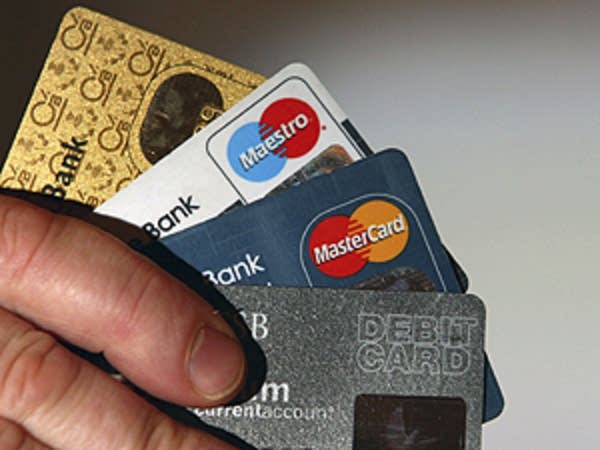Changes ahead for ATM, debit card overdraft fees

It's been a standard practice for many banks and credit unions to automatically enroll customers in overdraft protection plans for ATM and debit card transactions. The plans allow customers to continue to withdraw money even when their account is empty.
Consumer groups have derided the plans as outrageously expensive, costing customers billions of dollars in fees. With new rules taking effect this month and next, consumers won't be enrolled in the plans unless they grant permission.
John Patrykus of south Minneapolis says he'd rather have a debit or ATM card transaction declined than pay a hefty fee, say, to get a cup of coffee. Patrykus says he won't be signing up at his bank, TCF, for overdraft protection.
"I don't want a $37 cup of coffee. I want a $2 cup of coffee. So, absolutely, shut it down," said Patrykus.
Create a More Connected Minnesota
MPR News is your trusted resource for the news you need. With your support, MPR News brings accessible, courageous journalism and authentic conversation to everyone - free of paywalls and barriers. Your gift makes a difference.
Banks and credit unions are trying to convince customers that overdraft protection for ATM and debit card transactions makes sense. They argue it allows consumers to make essential purchases, avoid missing critical payments and escape the embarrassment of having a transaction declined.
That doesn't resonate with Sherrill Neudahl of River Falls, Wis. She's among those consumers who would just rather have a transaction declined, which is what will happen if a consumer doesn't opt into overdraft protection.
"If you get into a situation where you don't really realize that you're in an overdraft situation, then it could be very expensive," said Neudahl.
"There are better ways to cover these small loans. Really, who wants to pay $35 for a $5 hamburger?"
Banks, however, contend most people want overdraft protection.
"In the last year, 82 percent of consumers paid no overdraft charges at all. And of the folks that did pay an overdraft fee, 96 percent said they were glad the payment was covered," said Joe Witt, president of the Minnesota Bankers Association.
Witt says overdraft protection gives consumers welcome flexibility, even if it comes with a fee of $20, $30 or more.
"If you do a math error and you're not exactly sure how much money you have in your account, you want to make sure those transactions will go through," said Witt.
US Bank has been talking with customers about overdraft protection since June. Christine Hobrough, who oversees US Bank's metro-area branches, says a majority of customers seem ready to continue with it.
"Based on the anecdotal information I'm getting from our branches, most of the customers they talk with are opting in," said Hobrough. "That tells me they've thought about their financial situation and how they use their account, and it's a good decision for them."
It may have something to do with the bank's decision to lower overdraft fees, starting next month. Overdrafts of $20 or less, for instance, will be assessed a $10 fee at US Bank. Other overdrafts will get hit with a $33 fee.
Not all financial institutions are on the same page about overdraft fees.
Kyle Markland, president of the Affinity Plus credit union based in St. Paul, says the new rules won't make much difference to his customers. He says Affinity Plus never got into charging overdraft fees for ATM and debit transactions. The credit union has simply denied those transactions when a customer was overdrawn.
Markland expects most consumers won't sign up for plans that hit them with overdraft fees.
"We don't believe that you should knowingly allow somebody with a debit card at a merchant or at an ATM to overdraw their account, so you can get $29 or $35 fee out of them," said Markland.
Consumer groups say their surveys show most people hate overdraft fees and consider them unfairly high.
"Just say, no. Don't opt in," said Kathleen Day, a spokeswoman for the Center for Responsible Lending, a consumer advocacy group.
Day says overdraft fees have typically run between $34 and $39. And last year, Days says overdraft fees for ATM and debit card transactions brought banks some $12 billion.
"There are better ways to cover these small loans. Really, who wants to pay $35 for a $5 hamburger?" she said.
Day advises consumer to sign up for programs that protect them from ATM or debit card overdrafts by tapping savings accounts or lines of credit -- hopefully, without incurring any fees.
But, she warns, overdraft charges for checks or automatic payments are not covered by new federal rules, and customers may not be able to avoid those fees.
